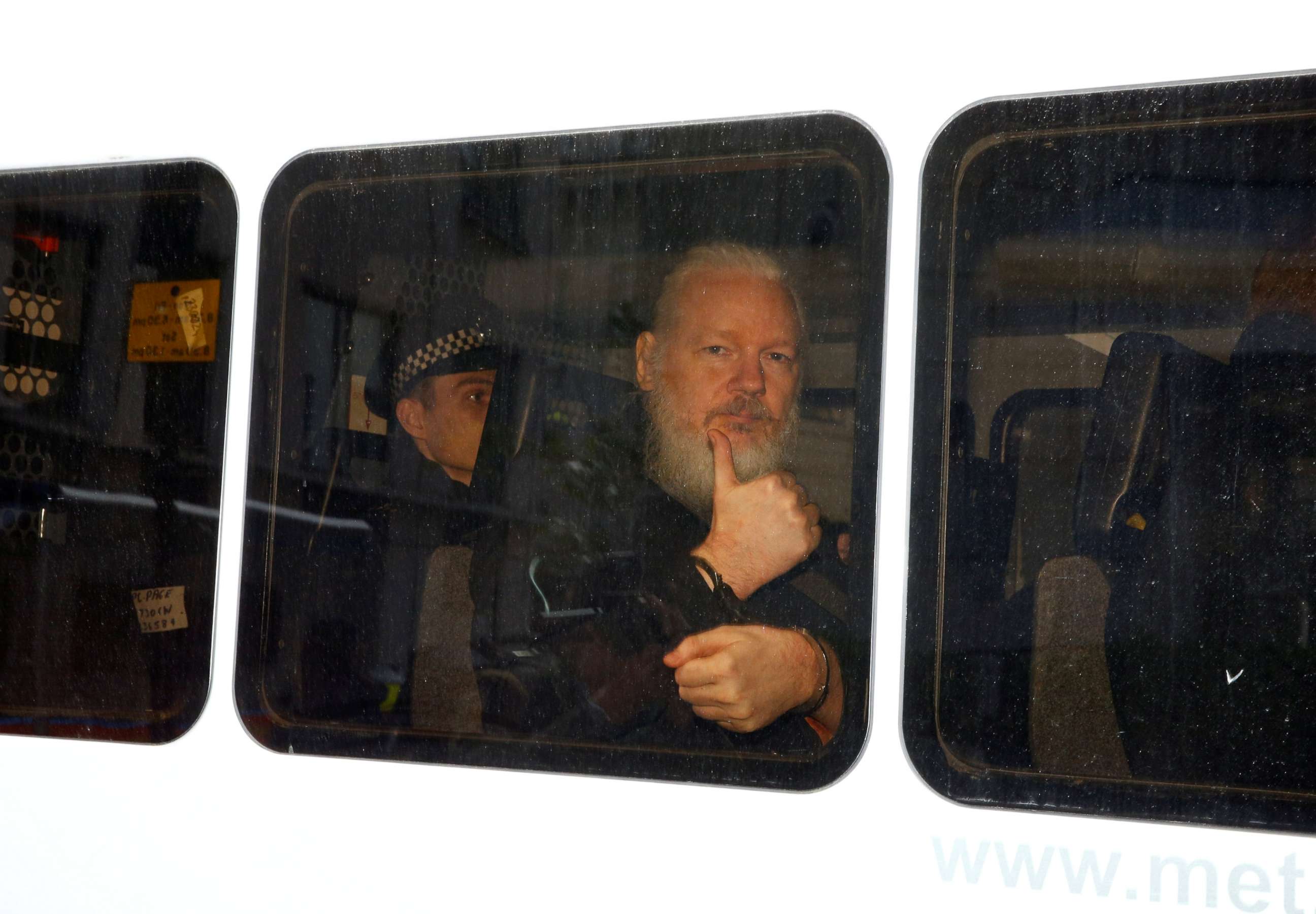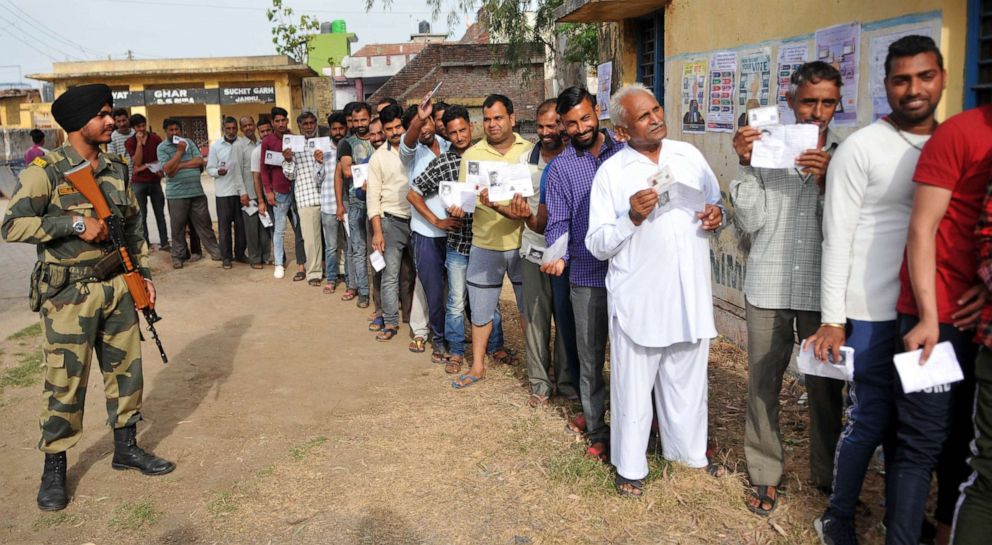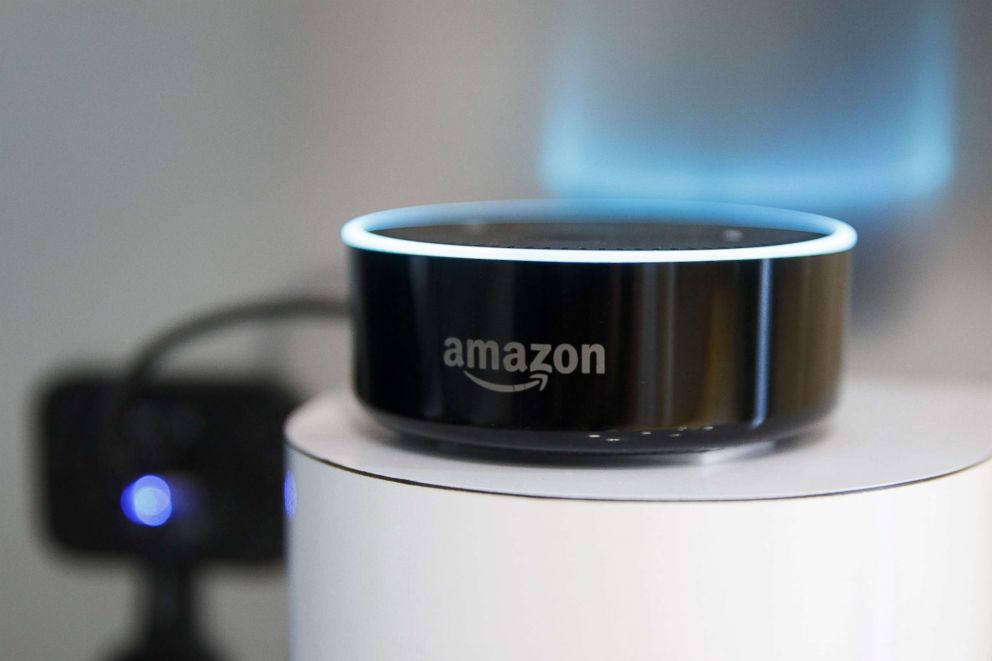'Start Here': Julian Assange faces extradition after arrest in UK, and it's literally election season in India
Here's what you need to know to start your day.
It's Friday, April 12, 2019. Let's start here.
1. Arrested development
After spending seven years at the Ecuadorian embassy in London, Wikileaks founder Julian Assange, looking haggard and with a bushy beard, was dragged away by British police on Thursday.
Assange was arrested for "failing to surrender to the court" over a 2012 warrant, dating back to a now-closed rape inquiry in Sweden, according to Metropolitan Police. During Assange's initial court appearance he was found guilty of breaching his bail and now faces up to a year in jail. He remains in custody in London.
Meanwhile, in the U.S., an indictment was unsealed targeting Assange on a single count of conspiracy to commit computer intrusion for allegedly helping Chelsea Manning, then an Army intelligence analyst, break into a Pentagon computer. Wikileaks later published classified materials, in March 2010.
Barry Pollack, Assange's U.S.-based attorney, said his arrest was "bitterly disappointing."
Assange, also accused of smearing feces on the walls of the Ecuadorian embassy, is preparing to fight extradition to the U.S., as ABC News' James Gordon Meek tells us on today's podcast: "I cannot imagine that he would ever go quietly into the night."

2. Democracy writ largest
Millions are casting votes in India, the world's largest democracy, where about 900 million eligible voters reside among a population of 1.3 billion.
Lengthy lines were seen Thursday as the massive, seven-stage election kicked off, with voters deciding on 543 parliamentary seats as well as on the future of Prime Minister Narendra Modi.
ABC News' Guy Davies says voters' decisions also could tilt India toward or away from a more secular mindset.
"Is it going to be a secular country, where Muslim and Hindu interests are treated equally," Davies asks on "Start Here," "or, as some nationalists would say, is it going back to its roots as a traditionally Hindu country?"
Election results are expected May 23.

3. Alexa, stop listening
Alexa isn't the only one listening when people talk to their Echos.
Thousands of Amazon employees around the world are listening to voice commands, reviewing and transcribing information as part of an effort to improve the device's algorithm, Bloomberg News reported.
"This information helps us train our speech recognition and natural language understanding systems, so Alexa can better understand your requests and ensure the service works well for everyone," an Amazon spokesperson said in a statement to ABC News, adding that audio isn't stored unless triggered by a wake word and that customers can delete voice recordings at any time.
Adam Levin, a consumer advocate and founder of CyberScout, argues on "Start Here" that the devices probably are listening when users think they're not -- to hear and respond to wake words.
"The truth of the matter is," Levin tells us, "privacy should be the default setting with everything in our lives, as opposed to you need to opt in order to get the benefit of privacy."

"Start Here," ABC News' flagship podcast, offers a straightforward look at the day's top stories in 20 minutes. Listen for free every weekday on Apple Podcasts, Google Podcasts, iHeartRadio, Spotify, Stitcher, TuneIn or the ABC News app. Follow @StartHereABC on Twitter, Facebook and Instagram for exclusive content and show updates.
Elsewhere:
'Using human beings -- including little children -- as pawns in their warped game to perpetuate fear and demonize immigrants is despicable, and in some cases, criminal': The White House, as first reported by The Washington Post, was considering transporting immigrants detained at the U.S.-Mexico border to sanctuary cities as political payback, including to House Speaker Nancy Pelosi's district in San Francisco, about which her communications director said: "The extent of this administration's cynicism and cruelty cannot be overstated."
'The Jesuits sold my family and 40 other families so you could be here': Georgetown students vote overwhelming in favor of a $27-per-semester fee to benefit descendants of slaves sold by the university, which still must officially enact the policy.
'I chose to come to Michigan State University. I did not choose to be gang raped.': A woman who says she was sexually assaulted as a Michigan State freshman in 2015 by three basketball players goes public with allegations that the school asked her to cover it up.
From our friends at FiveThirtyEight:
Politics Podcast: We evaluated all of our forecast models. They're reliable.: Fortunately, it turns out they're well calibrated.
Doff your cap:
She's been Justin Bieber and Ruth Bader Ginsburg and Jeff Sessions and Kellyanne Conway and, perhaps most famously, Hillary Clinton.
Now Kate McKinnon will be Elizabeth Holmes.
Kate McKinnon to reportedly star in new series based off ABC News' 'The Dropout'
In a six- to 10-episode Hulu series based on "The Dropout" -- an ABC News podcast and "20/20" special spearheaded by ABC News' Rebecca Jarvis, who, in one episode, interviews Wall Street Journal reporter John Carreyrou, the two-time Pulitzer Prize winner who blew the lid off the whole thing and wrote a book about it -- McKinnon will tell the tale of Theranos, Holmes' startup that promised to process hundreds of tests from a drop or two of blood and never came anywhere close to that.
Holmes and Ramesh "Sunny" Balwani, the company's former chief operating officer with whom she had a secret romantic relationship while running the company, are facing federal fraud charges and set to appear in court later this month. Holmes, in addition to massive fines, could see 20 years in prison.
"I would be surprised," Preet Bharara, former U.S. Attorney for the Southern District of New York, told Jarvis, "if she got less than 10 years."




